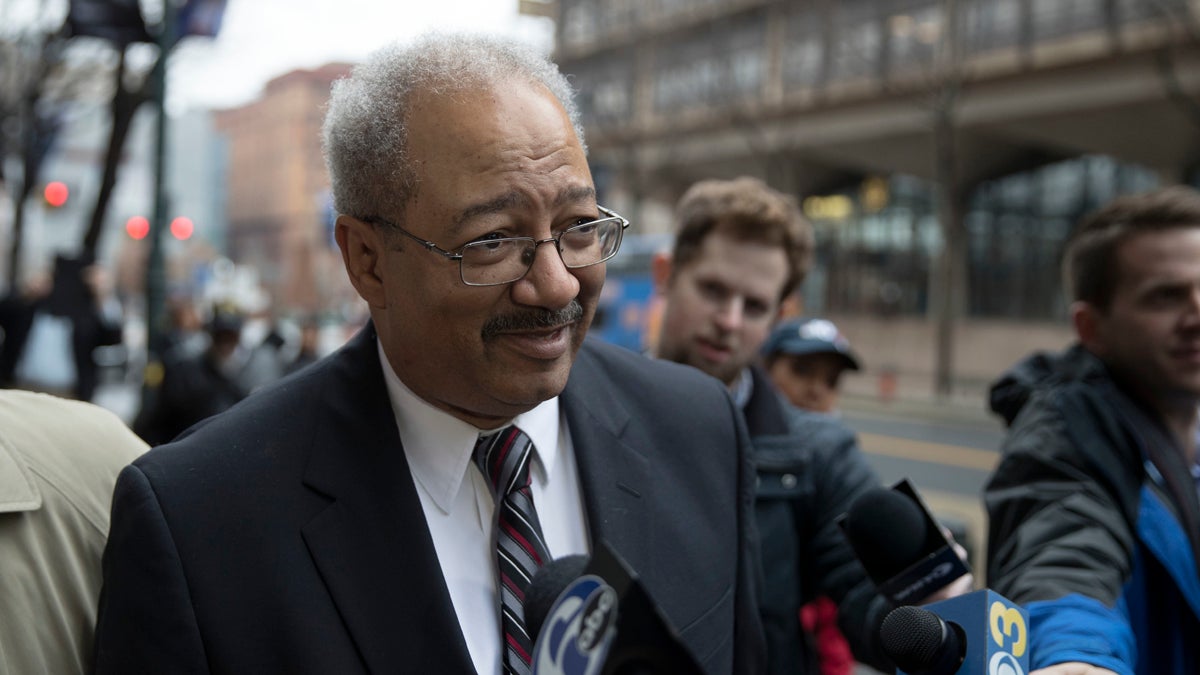Federal judge unseals documents, explains why he dismissed juror in Fattah case

Former Rep. Chaka Fattah
A federal judge has unsealed court documents surrounding the June dismissal of a juror weighing the fate of former U.S. Rep. Chaka Fattah, who was sentenced Monday to 10 years in prison for his public corruption conviction.
In a memo filed Friday afternoon, U.S. District Judge Harvey Bartle III reiterated what he wrote in a June 17 court transcript, writing that he dismissed Timothy Miller because he “delayed, disrupted, impeded, and obstructed the deliberative process and had the intent to do.”
“I base that having observed him, based on his words and his demeanor before me. He wants only to have his own voice heard. He has preconceived notions about the case. He has violated his oath as a juror,” said Bartle.
The five-page document also incudes excerpts from notes passed from the jury foreman to Bartle.
“Juror Number 12 has an agenda or ax to grind w/govt,” reads one note.
“We feel that [Juror 12] is argumentative [and] incapable of making decisions. He constantly scream [sic] at all of us,” reads another signed by nine of the jurors.
In a story for PhillyVoice, reporters George Anastasia and Ralph Cipriano quote the dismissed juror, who left the panel on the second day of deliberations.
Miller, who served in the military, told the reporters that, on a number of ocassions, he was the only one on the panel who wasn’t willing to convict a defendant.
“It was 11-1 for five hours straight waiting for me to change my mind. I said, ‘I’ll hang the jury. I’m not gonna change my mind,” said Miller
That made things tense, he said.
“They were talking about getting rid of me right away. In the first hour, people were yelling at me, ‘You’re an idiot.'”
Miller said he wasn’t refusing to work with the other jurors, he simply didn’t think proseuctors presented enough evidence to convict.
The documents may be used during the appeals process.
Bartle ordered a reconstituted jury to start its deliberations anew after the juror was removed from the case.Three days later, after roughly 14 hours of deliberation, the panel announced guilty verdicts for Fattah and his four co-defendants.
Lawyers for the Philadelphia Media Network, owners of The Philadelphia Inquirer, the Daily News and Philly.com, filed the motion to unseal records from June 16 and June 17 – the day before and the day of the dismissal.
During a brief hearing Friday morning, Pepper Hamilton attorney Eli Segal argued the public has common law and First Amendment rights to review court materials, especially when they’re part of a corruption case involving an elected official.
“The public really cares what’s going on here,” said Segal, adding that access to court records “promotes the public understanding of the judicial process” and confidence in the system overall.
Segal also asked Bartle to allow prosecutors and defense attorneys to publicly discuss the dismissal. Bartle had instructed lawyers on both sides to keep quiet.
None of the defense attorneys repesenting Fattah or his co-defendants objected to the records being released.
The goverment took no position one way or the other. Prosecutors did express concerns about potential threats to jurors if their names were released. The case did not have any anonymous jury.
In June, Fattah was found guilty of orchestrating what prosecutors called a “white-collar crime spree.”
The jury said he stole hundreds of thousands of taxpayer dollars and charitable donations to repay part of an illegal $1 million loan he took during his failed bid for Philadelphia mayor in 2007.
The panel also found that he accepted bribes from a friend who wanted to become a U.S. ambassador; used campaign cash to help his son pay off some of his college loan debt; and pushed to create a fake environmental nonprofit as part of a plan to settle up with a political consultant he owed.
In addition to his prison sentence, Bartle ordered Fattah, along with his co-defendants, to pay more than $600,000 in restitution.
Fattah, who is expected to file an appeal, is scheduled to self-surrender on Jan. 25. The juror dissmissal could well be part of the appeal.
WHYY is your source for fact-based, in-depth journalism and information. As a nonprofit organization, we rely on financial support from readers like you. Please give today.





